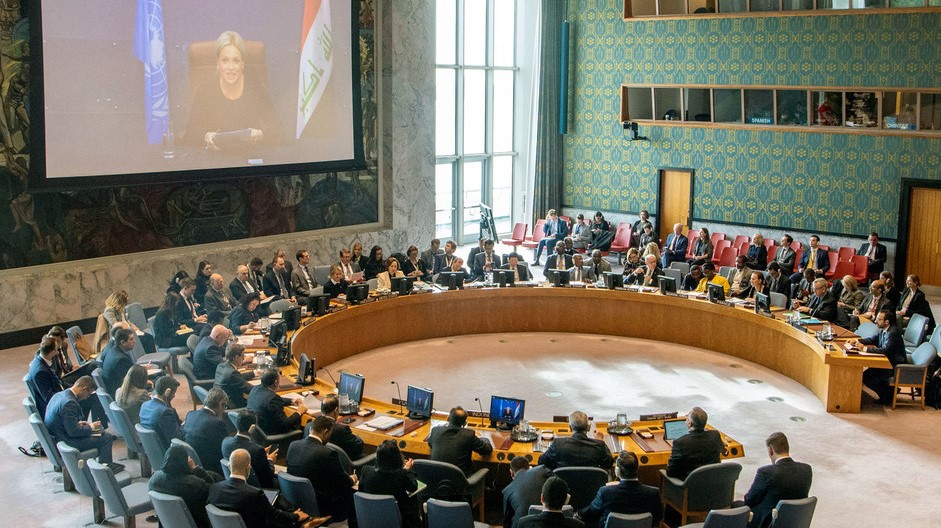Iraq turns the last page in Chapter VII: the economic and political implications of the UNSC decision

Shafaq News/ With the resolution adopted by the United Nations Security Council (UNSC) last Thursday, Iraq has turned an important page in its troubled national history. After more than 30 years of punitive measures put in place under Chapter VII of the United Nations Charter, the country has now ended its pariah status in the international system. Iraq has managed to fulfill its final Chapter 7 obligations after a brief break due to ISIS's invasion of vast areas of the country, closing, both literally and figuratively, a painful chapter in Iraq's history.
Chapter VII is the most coercive option available in dealing with threats to peace and acts of aggression, and allows the Security Council to authorize a spectrum of actions ranging from the introduction of sanctions to military interventions if states do not abide by the council's demands.
Assets that are frozen due to Security Council Resolution 1483 will be freed up. This resolution had targeted assets belonging to 89 individuals related to Saddam Hussein's regime and, more importantly, the foreign assets of 208 entities such as several Iraqi banks (including the Central Bank of Iraq-CBI), certain ministries, Iraqi Airways, and many other companies active in the agricultural, manufacturing, industrial, media, petrochemical, and construction sectors. The total amount of frozen assets is difficult to estimate: scattered across 20 different countries, accounts contain sums ranging from 1 billion to 38 billion euros. Most of these funds originate from the scandal-plagued "oil for food" program (which allowed Iraq to sell oil in spite of sanctions in return for medicine, food, and other humanitarian supplies). The regime managed to circumvent the program’s limitations through corruption and kickbacks, often transferred to bank accounts abroad.
The CBI said that Iraq has plugged a tremendous economic drain, highlighting prospects of prosperity and openness to international investments.
"We hope this achievement contributes to integrating the Iraqi banking sector into the international system and boosting the monetary resources," the CBI said in a statement.
The economic advisor to the Iraqi Prime Minister, Mudher Saleh, said that the compensations chomped a huge chunk of the national Gross Domestic Product (GDP) of the country. "It is sufficient to build a power grid that invigorates Iraq for years," he said.
"Iraq will be able to recover the frozen assets held under escrow by the UN in the development fund for Iraq, among proceeds from other assets that are frozen in states and international organizations," he said, "Iraq will be allowed to import previously banned technology. The resolution will also boost the investment climate of Iraq and its credit rating."
Economic experts believe that the sums that used to drain nearly six to seven million dollars from the Iraqi treasury on a daily basis will be able to cover a significant portion of the state expenditures, hoping that they would be invested in sustainable investment projects.
Iraqi Foreign Minister Fuad Hussein told the council that his country has concluded "an important 30-years-long chapter and embarks on a new chapter in its diplomatic, political and economic journey."
"This will be an era of a more prominent regional and international role, commensurate with Iraq’s historical and cultural significance for the region and the world, an era during which Iraq will be an active member committed to the aspirations and goals of the international community," he said.
Indeed, the 15-member UN Security Council's decision to remove Iraq from Chapter VII underscores the country's increased cooperation with its neighbors and marks an end to Saddam Hussein's legacy of aggression.
States under Chapter VII are not only officially viewed as a threat to international peace and security; they also have their sovereignty significantly curtailed. Therefore, the transition to Chapter VI, according to experts, means that Iraq is a peaceful state that resolves its disputes via peaceful mediation. Aside from being a positive sign of Iraq's recovery to its full interaction with the international community, it provides promising opportunities for foreign investment in the country, particularly in the post-Kuwait donor conference on the reconstruction and investment of Iraq.
Iraq became subject to sanctions on August 6, 1990, four days after its invasion of neighboring Kuwait. UN Security Council Resolution 661, later complemented by Resolution 687 in April 1991, imposed a series of sanctions on Baghdad which included restrictions on free trade, financial dealings, weapons sales, flights, and various imports. It also included an inspection system designed to prevent Iraq from obtaining and maintaining ballistic missiles and nuclear, chemical, and biological weapons. Most of these sanctions (often criticized for having hurt the population at large more than the regime) were lifted in 2003, after the toppling of Saddam Hussein; but not all were rescinded, due to some disputes between Iraq and Kuwait. UN Security Council Resolution 1483 replaced the punitive measures with asset freezes and a limited weapons embargo which allowed for Iraq to rebuild its security apparatus with conventional weapons. Unfortunately, the dispute between the two. Neighbors could not be settled quickly as it encompassed an array of financial and political files which had remained unresolved for decades. These included the contested border demarcation between the two states, and therefore tapped into a history of state formation under the British mandate.
Based on UN Security Council Resolution 687, Iraq is liable not only for the damages incurred during its invasion of Kuwait, but also for the debt owed to the emirate before 1990. Compensation is required, i.a. for the seizure of 10 aircraft belonging to Kuwait Airways, the theft of Kuwait’s national archive, and environmental damage. A United Nations Compensation Commission determined that Baghdad must pay a total sum of 31.5 billion euros (52.4 billion dollars). Most of the compensation went to the Kuwaiti government and oil sector, and was paid out of an UN-managed fund into which Iraq paid 5 percent of its oil revenue.





